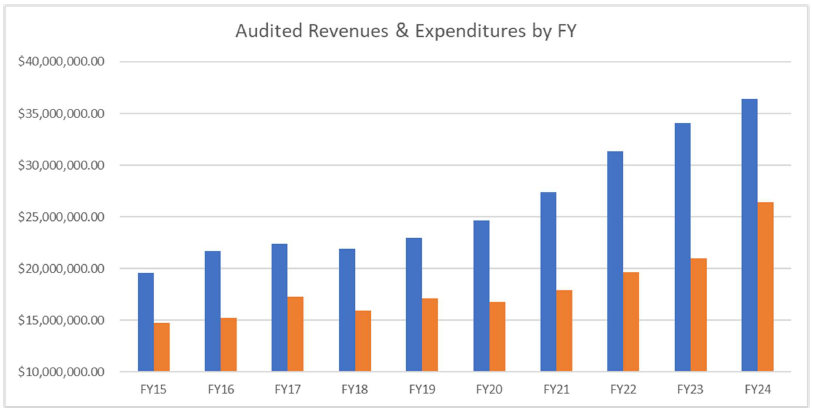Voting rights advocate groups sue to block Alabama’s absentee voter restrictions
Published 1:00 am Saturday, April 6, 2024
A coalition of civil rights, voting rights and disability rights advocacy organizations filed a lawsuit to block Alabama’s recently enacted ”Anti-Ballot Harvesting Bill” sponsored by Sen. Garlan Gudger (R-Cullman).
Enacting Senate Bill 1 into law before November’s general election has been a top priority of Alabama’s Republican lawmakers and has been since it was prefiled in late 2023. Gudger has said the restrictions the bill places on the absentee voting process are intended to protect the state from “ballot harvesting,” which he said involves groups seeking to profit from the electoral process.
Trending
Under the law, anyone who returns another person’s absentee ballot application or distributes a prefilled application with another voter’s name or other information could be charged with a Class A misdemeanor. Collecting any type of payment or receiving a “gift” to “distribute, order, request, collect, prefill, complete, obtain or deliver a voter’s absentee ballot application,” would be considered a felony and could be punishable by up to a 20-year prison sentence.
The plaintiffs in the suite — Alabama State Conference of the NAACP, Greater Birmingham Ministries, League of Women Voters of Alabama and Alabama Disabilities Advocacy Program — are alleging that the bill contains overly vague language and harsh penalties that could hamper their efforts to assist marginalized communities exercise their rights to participate in the democratic process.
The coalition is represented by Campaign Legal Center, Legal Defense Fund, Southern Poverty Law Center, American Civil Liberties Union of Alabama and Alabama Disabilities Advocacy Program.
“I think it is very telling that this session of the Alabama Legislature has really focused on creating new criminal penalties and building new barriers to election participation instead of increasing civic engagement,” ACLU counsel Laurel Hattix said. “SB1 is just the latest iteration of Alabama’s long history of attempting to prevent nonpartisan, community-based organizations who focus on helping some of the most marginalized members of our community be able to vote.”
President of the LWVAL Kathy Jones said versions of the bill have been introduced since the 2020 election and the group has been opposed to each of them. She said the final version of SB1 may appear different from its previous iterations, but it was no less troubling for community-led voting organizations throughout the state.
Jones said LWVAL is comprised of volunteers who regularly educate voters on their voting rights and, when asked, will assist people with filling out absentee ballot applications. She said SB1 would call many of those discussions and activities into question.
Trending
“This bill basically gets between us and the voter and keeps us from having a free and open dialog about voting and absentee voting. When it passed into law, there are several aspects that we feel could trip up our members and cause them to be prosecuted,” Jones said.
The lawsuit names Alabama Attorney General Steve Marshall, the state’s 42 district attorneys and Alabama Secretary of State Wes Allen as defendants. A representative from Allen’s office told The Times in an email that he was unable to comment on the lawsuit because it involved pending federal litigation, and said all questions should be directed to AG Marshall’s Office.
Voice messages left with the AG’s office were not responded to by presstime.
Gudger defended the bill in a text message to The Times Thursday evening and said it prioritized “transparent, trackable and publicly verifiable,” elections.
“Allowing ballot harvesting undermines the security and authenticity of our elections and compromises our trust in the electoral process. Without this legislation, out-of-state organizations can freely manipulate our elections by offering payments for absentee ballots and mailing pre-filled applications to voters,” Gudger said in the text message.
State law does prohibit groups from providing payment to a voter in exchange for their absentee ballot, but those prohibitions are not included in SB1.
Hattix said that the bill’s targeting of absentee applications rather than the ballots themselves makes it, in her opinion, one of the most restrictive laws of its kind in the country. She said the way the law is written it would prevent another person from even putting a sealed envelope containing an absentee application into a mailbox.
“I think what is so concerning of the targeting of absentee voting applications is that this will prevent people from ever even getting the opportunity to vote absentee. If you are blind, disabled or incarcerated it is extremely difficult and in some situations impossible for you to be the one to hand-deliver or submit your application to a mailbox,” she said.
Hattix also disputed Gudger’s claims of the state experiencing an issue with ballot harvesting.
“First, we haven’t seen any widespread evidence of voter fraud attributable to absentee voting. Second the evidence that was presented was just the absentee voter turnout rate which in and of itself is not fraudulent activity,” Hattix said.
Alabama did not begin consistently tracking absentee votes until 2020, but in each election after the 2020 General Election, the number of statewide absentee ballots have been between 3 and 5%. Four Democratic led counties across Alabama’s “black-belt” — Bullock, Lowndes, Perry and Wilcox — have maintained significantly higher percentages which at times have reached near 20%.
“Do we really think that one in five votes are absentee in some counties? Doubtful,” Gudger previously told The Times. “A 400 to 500% increase from the state’s average of absentee voting could be an indication of fraud.”
According to The Heritage Foundation, a conservative leaning think tank, there have been 25 convictions for voter fraud since 2000 in Alabama. Of the cases involving absentee ballots, two involved any type of financial transfer.
Hattix also said there are glaring issues with what she described as the bill’s “unconstitutionally vague” language. The bill leaves many terms undefined which she said removes the ability for people and organizations to know if their actions could be considered illegal.
The complaint mentions how many nonprofit organizations typically offer token gifts such as branded t-shirts, pens or stickers to volunteers which could easily be interpreted as criminal activity under the law.
“With respect to the law’s harsh implications on civic engagement activity, Senator Gudger himself agreed that providing an absentee voter ‘a stamp [or] sticker’ in connection with absentee voter assistance would violate the law. He also acknowledged that SB 1 raised concerns about criminalizing “the grandfather giving the grandson $5 for gas money,” but suggested that Alabamians simply ‘not . . . worry about [that],’” the complaint states.
Sen. Robert Smitherman (D-Birmingham) raised such concerns to Gudger on the Senate floor before the bill was approved. He said that, without a definition of what could be considered a “gift,” the term would likely default to being “anything of value.” He said this interpretation could be used to target political opponents for supplying campaign volunteers with something as simple as lunch or a bottle of water.
Gudger responded to Smitherman and said the law has what he called “willing intent” built into its language. While that specific term does not appear in the law, Gudger said he felt as though Smitherman was “splitting hairs.”
“I don’t think you’re going to have anybody worrying about that bottle of water or a stamp or splitting hairs on this stuff,” Gudger said.
However, Hattix said now that the law has been enacted, it would no longer be left up to Gudger to defend the bill’s intent and his statement would mean little to the courts tasked with interpreting its language.
“It is not enough that Sen. Gudger made a brief statement about what this bill may or may not criminalize when what we know is that those terms are not defined in the bill,” Hattix said. “I think that is one of the largest concerns. Because the bill itself does not define those terms, therefore it sweeps in a lot of conduct that is constitutionally protected and permitted,” Hattix said.
A federal judge in June blocked a Mississippi law from taking effect that named a short-list of people who can “collect and transmit” an absentee ballot. The judge wrote that the Mississippi law violates the Voting Rights Act, a federal law that says any voter who is blind, disabled or unable to read may receive assistance “by a person of the voter’s choice.”
Patrick Camp can be reached at 256-734-2131 ext. 238




